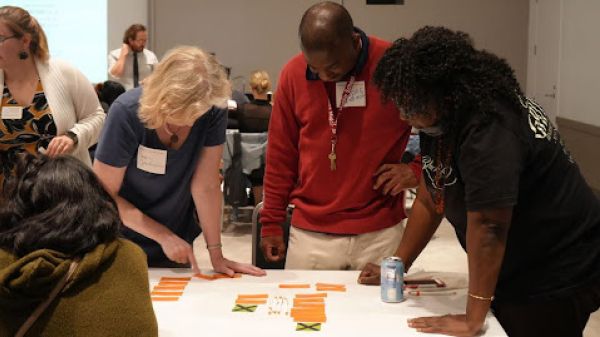Civic Engagement and Policymaking: A New Toolkit for Science Engagement Professionals

This post was written by Naomi Wallace, Senior Manager of Programs, and Jenny Crayne, Manager of Programs, Association of Science and Technology Centers (ASTC).
As science engagement professionals, we know that informed, collective action is the most powerful tool for protecting and promoting human and environmental health.
And, as with all tools, it helps to have a user’s manual.
The Civic Engagement & Policymaking Toolkit from the Association of Science and Technology Centers (ASTC) is a new collection of resources designed for science engagement organizations—including museums, nature centers, nonprofits, scientific societies, and other institutions—looking to start, expand, or improve civic engagement in their communities.
What is Civic Engagement and Policymaking?
For ASTC, “civic engagement” encompasses all the different ways in which people can actively participate in decision making to improve their communities. These activities can be individual or collective, political or non-political, and locally focused or part of broader efforts across the nation or globe.
“Policymaking” is a particular kind of civic engagement related to the processes that codify ideas, plans, or principles for decision making for institutions. This can, of course, mean government policies, but can also include institutional policies like those that govern a school, museum, or any other organization. In the context of environmental education (EE), policymaking activities could include things like advocating for urban planning regulations that preserve greenspace or lobbying a university to divest from fossil fuels.
For example, in response to community concerns about extreme heat, the Science Museum of Virginia, Groundwork RVA, and Richmond-area youth collaborated on Throwing Shade in RVA; through this project, students used cameras and thermometers to explore urban heat islands, identifying questions and collecting data to inform local planning related to climate resilience, including the development of five new parks in Richmond’s Southside. More than 70 cities have adopted this model of community-driven data collection to understand and address the impacts of urban heat islands.
ASTC’s Civic Engagement & Policymaking Toolkit is part of a broader Community Science Initiative, which builds capacity for science engagement organizations to engage in collaborative, community-driven efforts (including civically oriented projects) that use science to advance local priorities.
Civic Engagement & Policymaking Toolkit Components
- Landing Page
- Contains a general overview, some definitions, and a brief, downloadable summary of the Toolkit.
- Dispelling Myths about Civic Engagement
- Discusses why non-profits (and museums specifically) can and should participate in civic engagement, including sharing examples of existing projects and clarifying the limits of non-profit lobbying.
- About This Community Science Approach
- Covers how civic engagement & policymaking looks when it is done as a Community Science Approach – with community priorities and values at the center.
- Critical Preparations for Civic Engagement
- Features some first steps to help prepare your organization for civic engagement, including discussion questions, advice for understanding and connecting with your community, and tools like Power Mapping and Risk Registers.
- Roles for Science Centers and Museums
- Every community has their own needs, and every organization has their own strengths, so we defined four roles that your organization could play.
- Fostering Civic Action
- Encourage your local community to take action by communicating connections between civics and science, uplifting existing civic activities, sharing your physical space, or facilitate opportunities for community discussion.
- Generating Data for Civic Progress
- Produce, interpret, visualize, and/or share data to inform decision making by sharing technical knowledge and equipment, collaboratively identifying research questions, and storing and sharing data that can inform evidence-based decisions.
- Contributing to Coalitions
- Forge connections for action by finding, supporting, and joining existing coalitions, or bringing organizations together to form a new coalition.
- Building Momentum and Refining Strategies
- Connect community members and decision makers so they can directly advocate for themselves, amplify community voices, and evaluate and iteratively improve upon your civic engagement work.
- Glossary
- Definitions of complex terms as they are used within this toolkit.
- Resource Library
- Our expansive collection of Community Science resources, filtered for those specifically related to civic engagement and policymaking.
What role can science engagement organizations play?
Science engagement organizations—including EE organizations—have both strategic and practical questions about whether and how they should engage in civic activities. The toolkit provides guidance for:
- Aligning civic engagement with your organization’s existing mission, vision, and values. Many organizations’ strategic plans already include elements related to informed action and collective change; civic engagement is about putting those strategies to work.
- Shifting from a mindset of “neutrality” to one of “common ground.” Many people believe that science, and by extension science education, is and should be civically and politically “neutral.” But science is a human process carried out by people who inevitably bring perspectives and biases to the work. This means the process of science is embedded in, and reflects the biases of, broader society.
- Distinguishing advocacy and lobbying. It’s a common misconception that nonprofit organizations are barred from participating in all political activity. The toolkit provides resources for distinguishing between disallowed activities (such as lobbying for specific legislation or candidates) and activities that are both allowable and impactful—such as gathering civically relevant data with your community and presenting it to a local legislator; providing opportunities for community members to share their stories; or holding a voter registration drive.
Recognizing that every community has their own needs, and every organization has their own strengths, the toolkit outlines four key roles that EE and science engagement organizations can play in civic engagement, along with specific resources and stories to help organizations step into each of those roles. They include:
- Fostering Civic Action. Encourage your local community to take action by communicating connections between civics and science, uplifting existing civic activities, sharing your physical space, or facilitating opportunities for community discussion.
- Generating Data for Civic Progress. Produce, interpret, visualize, and/or share data to inform decision making by sharing technical knowledge and equipment, collaboratively identifying research questions, and storing and sharing data that can inform evidence-based decisions.
- Contributing to Coalitions. Forge connections for action by finding, supporting, and joining existing coalitions, or bringing organizations together to form a new coalition.
- Building Momentum and Refining Strategies. Connect community members and decision makers so they can directly advocate for themselves, amplify community voices, and evaluate and iteratively improve upon your civic engagement work.
Get Started!
If you’re looking to get inspired, read the brief examples on our About This Approach page. If your organization is new to civic engagement or is striving to re-center community priorities in this work, check out our Critical Preparations for Civic Engagement page and bring the discussion questions to your team.
Visit our Community Science page, where you can access a growing resource library of examples and tools to support civic engagement; register for upcoming virtual events; and sign up for our email list.
Have you used the toolkit? We’d love to know! Send your stories or questions to the ASTC Community Science Team at communityscience@astc.org.
ASTC would like to thank the Gordon & Betty Moore Foundation for supporting the Community Science Initiative.

